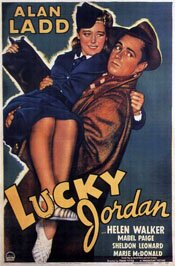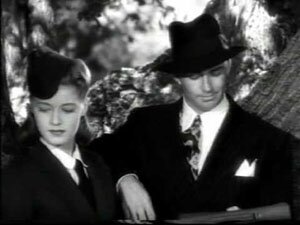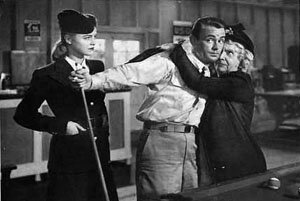 Directed by Frank Tuttle
Directed by Frank Tuttle
I really wish I had been around in 1942 and been in a theatre at a screening of this movie, Lucky Jordan. I think the response to it would have been fascinating to see.
The U.S. had already endured Pearl Harbour. They had entered World War II. And here was a movie where the lead character wanted nothing to do with the military; he had nothing but disdain for it.
How did they make that fly?
Undoubtedly it helped to have Alan Ladd, who was becoming a name by this time. (He had previously done movies like This Gun For Hire. This movie, Lucky Jordan, was the first one in which he had top billing, I believe.)
Ladd plays Lucky Jordan and through well over the first half of the movie he plays a gangster with no interest or love for anyone but himself and his money. He’s a cynic and believes everything and everyone can be bought, until he comes up against the draft board.
 He eventually finds himself in the Army where he is contemptuous of it. He goes AWOL and finally deserts. He comes upon secret military plans which another gangster (Sheldon Leonard as Slip Moran) has plans to sell to the Nazi’s. Slip also has plans to take over from Lucky.
He eventually finds himself in the Army where he is contemptuous of it. He goes AWOL and finally deserts. He comes upon secret military plans which another gangster (Sheldon Leonard as Slip Moran) has plans to sell to the Nazi’s. Slip also has plans to take over from Lucky.
But Lucky has other plans – get rid of Slip and sell the plans himself, but for more money.
In the process he kidnaps Jill Evans (Helen Walker), a woman in the military who pleads love of country to Lucky, but it falls on deaf ears.
The way the movie manages to turn the character of Lucky around, as eventually it must, is through an old woman living in poverty, Annie (aka ‘Ma’), played wonderfully by Mabel Paige. Annie and Lucky adopt one another, so to speak, and develop a kind of mother and son relationship. This is the first time we start to see chinks in Lucky’s cynical armor and the glimmers of a human being.
Alan Ladd plays the part of Lucky nicely. What often comes across is not hard-bitten and cynical but a sense of genuine puzzlement when his motives are questioned. Isn’t everyone out for themselves? Why would he do anything else?
 The movie ends with an inevitable patriotic finish, the final scene feeling like an obligatory add-on. But in the process of getting from start to end, it tells a good story about a particular character, Lucky Jordan. In the process, it doesn’t simply use a self-centred individual. The script gives some explanation for why he is as he is by giving some detail on his background.
The movie ends with an inevitable patriotic finish, the final scene feeling like an obligatory add-on. But in the process of getting from start to end, it tells a good story about a particular character, Lucky Jordan. In the process, it doesn’t simply use a self-centred individual. The script gives some explanation for why he is as he is by giving some detail on his background.
On the whole, this movie was a very pleasant surprise. It’s a movie cranked out by the Hollywood factory but it’s also one that manages to work well within its constraints – even push them a little, given how explicitly unpatriotic and unrepentant the character of Lucky is through a large portion of the film.



Pingback: For the Love of Film (Noir): This Gun For Hire